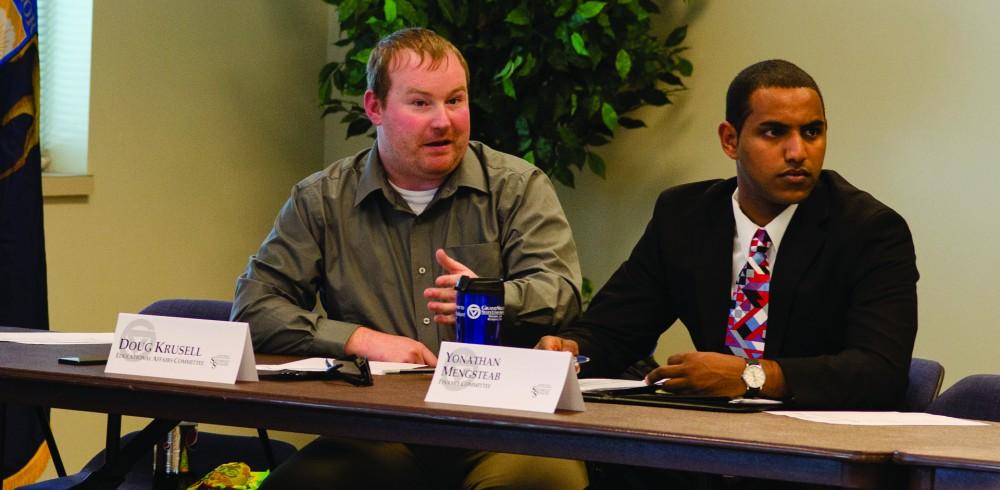Student Senate learns cross-cultural communication, social justice

GVL/Bo Anderson Student Senator Doug Krusell asks a question during a previous meeting.
Nov 18, 2012
Two guest speakers discussed the importance of students being aware of cultural differences as well as the importance of social justice at the Grand Valley State University Student Senate meeting Thursday.
Sean Huddleston, director of Intercultural Training in the Inclusion and Equity division, spoke to the senators about some of the misconceptions people have about cross-cultural interactions.
“Attitude is how you feel about connecting with other cultures, and how you feel about other cultures in general, and if that attitude is conditional,” Huddleston said. “Most of the time, we operate under this sense of fear. We fear that if we interact or have live encounters with what we’ll call ‘otherness’ that it will somehow ask us to change who we are in order to really be able to connect with them.”
Huddleston said that when people meet someone new, they make 11 assumptions about that person in the first 7 seconds.
“There’s certain elements of cultural competence,” Huddleston said. “The first one is having an awareness of your own cultural worldview. That’s really how you see culture and if you see culture in very broad strokes or as a system of subcultures that connect.”
The awareness is supplemented by knowledge.
“A person that’s becoming culturally competent has to understand or know what do they truly know about other cultures, but more importantly where did that knowledge come from?” Huddleston said. “Did it come from real, authentic interaction with not just one person, but many people from a culture, or third party information?”
Huddleston said everyone has their cultural biases, and those biases can’t be confronted until interacting with that culture. Sometimes the more people get to know that culture, the more they change what they think about it.
“As we are going through this process of becoming culturally competent and we have this understanding of all these different pieces that go together, it sometimes causes us to start to question some of our own beliefs and confront some of the biases that are inherent in all of us. Those are in all of us, we all have certain biases,” Huddleston said. “We get information all the time and we don’t question it, we just go with it.”
Huddleston gave the senators five tips for effective cross-cultural communication: Be aware of one’s own values, be aware of one’s own cultural filters and stereotypes, be aware of where one’s information comes from, validate one’s information with someone from that culture, and see situations from one’s own and the other culture’s perspective.
The second speaker who came to the senate meeting was Emily West from the LGBT Resource Center who came to talk about the Change U program.
“Change U is a social justice training series,” West said. “One of the cool parts about it is that it allows students, faculty, staff and community members to talk about these issues.”
The program has two main focuses, according to West. First, participants learn about social justice problems and what is and isn’t effective. Secondly, they work on not only understanding these problems but also alleviating them. “Both pieces together are really comprehensive,” West said.
Katie Carlson, vice president of the educational affairs committee, said the senate has received about 2,500 student responses and is approaching 400 staff responses to the fall break survey.
“The responses from the fall break survey have been really great,” Carlson said. “Everything that I’ve seen so far has been really supportive of it.”
Student Senate is drafting and passing many more proposals, including giving the LGBT Center more funding, expanding the uses of student ID cards, recognizing veterans and several more.
[email protected]





















